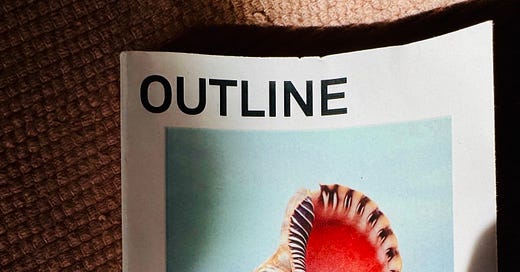Supplemental Reading - May 2025
Our supplemental reading(+) recommendations for May's Dear Readers selection, Outline by Rachel Cusk
A quick note from Cassie and Stevie:
Our “Supplemental Reading” is a way for our discourse on each month’s book to continue. We’ll be recommending other books that you may like if you liked the month’s pick; related books or articles by the author (or others); the source text that may have inspired the author; and movies, articles, and other media that feel appropriate to consume in light of the topic at hand. None of these lists are intended to be fully comprehensive, so please give us your suggestions as well.
Happy reading, Dear Readers!
xxoo, C+S
Our May 2025 book club pick: Outline by Rachel Cusk is a collection of 10 conversations retold to us by a fictional narrator. Outline is the first in a self-titled trilogy of books. The second and third in the series, Transit and Kudos, respectively, are also on our TBR list.
If you want more from Rachel Cusk herself:
This excerpt from her novel Second Place.
This interview in The Yale Review. Cassie particularly loved this response from Cusk on slowing down time: “Character is a very difficult thing to believe in or to assert the existence of in anything other than a very static set of circumstances, where character can confirm itself all the time. But now I think slightly differently, certainly, about the question of time. I wonder why I have never used my ability to slow down time and why, in the Anglophone novel, it’s a rare thing for anyone to do—to make time go very, very, very slowly in a book. I’ve moved to France, I’m reading French novels in French all day, every day, and this is the thing that I’m most struck by: They go much more slowly. Time pauses. The book’s location in time is completely different.”
An interview with Cusk and a profile in The New Yorker: “I Don’t Think Character Exists Anymore”: A Conversation with Rachel Cusk (November 18, 2018) and Rachel Cusk Gut-Renovates the Novel (July 31, 2017).
This very useful guide in The Guardian detailing “Where to Start” with the novels of Rachel Cusk; it flags Outline as her “beach read.”
If you want to read books Rachel Cusk likes/recommends:
The Beggar Maid by Alice Munro (as mentioned in this Q&A)
The Rainbow by D.H. Lawrence. Cusk says, “This is a book all women should read, to find out how we became what we are in the modern world; ditto all English people. Lawrence is the great analyst of transformation and change and self-realization, and this novel — about three generations of an English family — leaves readers with the skills to continue that analysis in their own living of life.”
Additional recommendations from Cusk are listed in this article on Radical Reads.
If you want books that were mentioned in this book:
Sons and Lovers by D.H. Lawrence, a highly autobiographic classic that offers a compelling portrait of childhood, adolescence, and the price of family bonds.
The Second Sex by Simone de Beauvoir. This “essential masterwork,” according to Vogue, is a foundational text of modern feminism that is still deeply relevant despite being written in 1949; it’s been on Stevie’s TBR for way too long—anyone wanna book club this?!
Wuthering Heights by Charlotte Brontë. Another English literature classic, this enduring novel was nominated as one of America’s best-loved novels by PBS’ The Great American Read.1
If you want more cool girl lit, read:2
Sally Rooney, Cassie’s personal favorite flavor of cool girl lit. Normal People might be her most well-known, for good reason, but don’t sleep on Beautiful World, Where Are You (Cassie’s fav, which is a slightly controversial take). Her newest, Intermezzo, and an earlier novel, Conversations with Friends, are also excellent. Normal People and Conversations with Friends have been adapted for TV—worth the watch, friends!
Joan Didion, an OG in the cool girl lit sphere. The Year of Magical Thinking and The White Album are great places to start. Slouching Toward Bethlehem3 has been on Cassie’s TBR for a while, as well.
Mona Awad, for the weird, contemporary gothic novels Mary Shelley would be proud of, like Bunny, Rouge, and All’s Well. (And, by the way, we’re looking forward to reading Shelley with the bookclub this fall—Frankenstein is our November pick! We’d love for you to read along with us.)
Annie Ernaux, for the French variety. Her novellas are originally written in French and translated. The Young Man (we’ve both read this within the past year) and A Girl’s Story (Cassie loved this one) are great places to start. Though her works tend to be on the shorter side (and easily consumable in one sitting/an evening), she’s extremely prolific, so you can’t go wrong when it comes to Ernaux.
Eliza Clark, for another darker, horror adjacent writer. Boy Parts, Penance, and She’s Always Hungry are on our lists.
A Theatre for Dreamers by Polly Samson, also happens to be set in the Greek isles—a two-for-two!

If you want more set in Greece:
Circe by Madeleine Miller is a retelling of Circe, who is the formidable sorceress in Homer’s The Odyssey. In fact, if you’re jonesing for a retelling/source text combo, consider reading Circe after you pick up a new translation of The Odyssey—this new edition is translated by Emily Wilson, the first woman to translate the work.
The Fury by Alex Michaelides is a thriller set on a private Greek island.
Ariadne by Jennifer Saint reimagines the story of Ariadne, Princess of Crete—a Greek mythological figure.
A Separation by Katie Kitamura (we love Katie Kitamura around here!!). This novel is a who-dunnit set in southern Greece.
Clytemnestra by Costanza Casati is a retelling that made our shortlist for this semester.
Your monthly delicious morsel of poetry to chew on today (this is one of Stevie’s favorites, and she’s turned to it repeatedly this year):
Small Kindnesses
I’ve been thinking about the way, when you walk
down a crowded aisle, people pull in their legs
to let you by. Or how strangers still say “bless you”
when someone sneezes, a leftover
from the Bubonic plague. “Don’t die,” we are saying.
And sometimes, when you spill lemons
from your grocery bag, someone else will help you
pick them up. Mostly, we don’t want to harm each other.
We want to be handed our cup of coffee hot,
and to say thank you to the person handing it. To smile
at them and for them to smile back. For the waitress
to call us honey when she sets down the bowl of clam chowder,
and for the driver in the red pick-up truck to let us pass.
We have so little of each other, now. So far
from tribe and fire. Only these brief moments of exchange.
What if they are the true dwelling of the holy, these
fleeting temples we make together when we say, “Here,
have my seat,” “Go ahead—you first,” “I like your hat.”
From Healing the Divide: Poems of Kindness and Connection (Green Writers Press, 2019).
As you’ve probably heard, NPR and PBS are being threatened by the current Administration; to learn more and take action, visit Protect My Public Media.
A brief primer if you need it!
This book could pair well with another TBR selection, James Baldwin’s The Fire Next Time (given the differing perspectives on America in the 1960s), and Stevie has this couplet on this fall’s syllabus for the work book club she leads.






